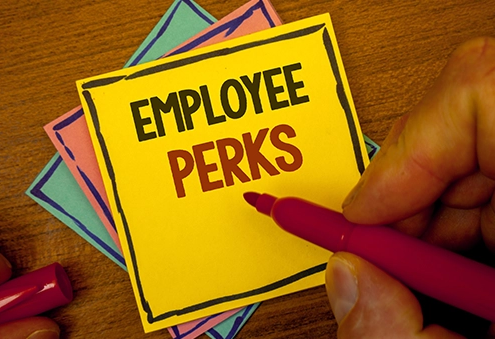Employee rewards don’t have to be taxing
Rewards aren’t just for Christmas – with the cost of living likely to remain at historically high levels in 2023 employers can offer a helping hand to their staff all year round.
However, business owners and managers may be concerned about both the cost and the possible tax implications of employee rewards schemes. It’s an understandable fear but one that is easily allayed.
We are now in an ultra-competitive recruitment and retention market. The smartest employers recognise there is more to keeping people happy and productive than just the headline salary.
Hiring and keeping the best people is critical to both business continuity and bottom-line profitability.
Creating a positive working environment where people feel safe and engaged to learn and grow is a big part of it. And offering real and tangible rewards is also a fantastic way to help people feel valued. Not convinced? There’s plenty of up-to-date research to back this up.
This year, corporate rewards and employee recognition specialist Love2shop published its Employee Value Report 2022. It found 33% of all UK employees feel undervalued at work. It added that 74% of people said they would look for a new job if they felt undervalued.
So, rewarding your teams leads to higher productivity, better staff retention and increased profits. What’s not to like? You may be worried about the cost of giving, but consider the cost of not giving.
Love2shop are the experts in this field. They have an impressive track record stretching back 20 years – partnering with more than 150,000 businesses to provide rewards and recognition for both staff and customers.
Via the Love2shop physical and digital gift platform and the Everyday Benefits Card, Love2shop offers a suite of options and tailor-made reward programmes.
But what are the tax implications for you and your employees, including those claiming in- work benefits? Rewards can have implications for tax and National Insurance Contributions (NICs) but there are exemptions.
Here are the facts from the experts at Love2shop…
Remember the basics
- Under HMRC’s ‘Trivial Benefits’ scheme a non-cash voucher (one that can only be exchanged for goods and services) up to the value of £50 is tax-free.
- Non-cash vouchers are not considered as earnings when it comes to calculating Universal Credit
This last point is particularly important for firms that want to reward ‘gig economy’ workers that may operate on a freelance or casual basis. For example, a private hire taxi firm whose drivers are self-employed but who also claim Universal Credit.
HMRC’s Trivial Benefits rules are easy to understand and well worth knowing. As above, a non-cash voucher up to the value of £50 is tax-free.
However, to qualify for the exemption it cannot be a reward for service or recognition of employment. It cannot be included as a contractual obligation and there can be no expectation from an employee it will be offered.
Typical examples could be a voucher to recognise a cultural or religious festival such as Christmas, Diwali or Eid. It could be a voucher given to an employee for a celebration such as a birthday, wedding or new baby. Or perhaps for someone who is unwell.
Most importantly in this tough economic environment, the tax-free exemption applies when an employer wants to support their teams amid the cost of living crisis. This allows the opportunity to provide a lifeline in terms of vouchers for essentials such as food.
And it is vital employers are aware the exemption is not available for rewards that incentivise work performance such as meeting sales targets or to an ‘employee of the month’.
Long service rewards
Many employers like to offer rewards for long-serving team members and HMRC offers an exemption for precisely that scenario. It is useful to know that such a reward could be worth up to £1,000.
To meet the criteria, it must be in recognition of at least 20 years’ service and the employee must not have received a long service award in the previous 10 years. The value of the voucher can be no more than £50 for each year. Which means a 20-year service award could be worth up to £1,000.
Annual events
There are also HMRC exemptions covering annual events – this may typically cover a Christmas party or a summer barbeque. To qualify for the exemption, the event must be annual and has to be open to all employees.
The total cost per head can be no more than £150 (VAT inclusive) and, is it vital to note, this figure is the figure per year not per event. So if you held both a Christmas party and summer barbeque the combined aggregate value must be no more than £150 per head.
PAYE Settlement Agreements
So, we have learned about the £50 voucher limit and the other exemptions. But it is important to bear in mind that rewards or vouchers outside of those exemptions are considered taxable earnings by HMRC.
Employers would ordinarily report the face value of the voucher on the employees Form P11D so it can be recovered by HMRC by adjusting the tax code or via a self-assessment tax return. NICs are also payable on the vouchers during the pay period they are issued.
However, the good news from Love2shop is that there is another way in which employers can minimise the tax liability of their employees and avoid reducing the value of the rewards.
Employers can choose to enter into what is called a PAYE Settlement Agreement (PSA) with HMRC to settle the tax and NIC on behalf of their employees.
This is a binding agreement with HMRC whereby an employer agrees to settle the tax and NICs of its employee. It covers benefits that are considered “minor or irregular” or where it is considered impractical to operate PAYE.
HMRC generally considers non-cash vouchers to be irregular and allows them to be included on a PSA.
An Employer can apply to HMRC for a PSA by setting out in writing the benefits which they want to include and also the tax year in which they wish the PSA to start. The address is:
PAYE Settlement Agreements HM Revenue and Customs BX9 2AN
PSAs are what is known as “enduring agreements”. This means they will remain in place indefinitely until an employer formally cancels the arrangement. If you have a PSA agreement already in place that doesn’t include non-cash vouchers you will need to contact HMRC to amend the agreement.
You will need to undertake calculations to work out the tax and NIC due under the PSA. This is calculated on a grossed up basis which can be a complex calculation. Before making any agreement you must contact HMRC or your own tax advisor to discuss how this will affect your business specifically.
Rewards for non-employees
Giving vouchers to non-employees, as per the example above – a taxi firm with self- employed drivers – will also see them liable to tax and NIC payments – although if they are claiming Universal Credit, they will not affect how that is calculated.
Similar to the PSA, an employer can enter into what is known as a Taxed Award Scheme (TAS) with HMRC.
Under the TAS you can select to pay tax on behalf of the individuals at either basic rate (20%) or higher rate (40%) tax. The tax will be due on the grossed-up value of the vouchers provided. To set up a TAS contact:
HMRC Incentive Award Unit
National Insurance Contributions & Employer Office Revenue & Customs
BX9 1BX
Telephone number – 0300 200 3200
Frank Creighton, Director of Business Development at Love2shop, explained that he and his team has the necessary know-how to quickly and simply set up an employee rewards scheme.
“The benefits of rewarding employees are clear in terms of increased productivity and retention. But this impact is enhanced by exceptions that enable rewards to be provided to employees with no tax and National Insurance burden for the recipient,” he said.
“Furthermore, Love2shop rewards and the Everyday Benefits Card offer a straightforward route in helping you to help your employees cope with a cost of living crisis that isn’t going away any time soon.
“We have all the expertise to help you set up a reward programme which can integrate seamlessly into your business processes and be delivered for a relatively low cost.
“Our Everyday Benefits Card offers a 7.5% discount to employees on their day to day spending. It can also help with larger one-off purchases. We have calculated the average family can save more than £1,300 a year via the card.
“We can deliver it swiftly to your employees at their workplace or even their home. There has never been a better time to start rewarding those people who are vital to the wellbeing of your business.”
Disclaimer:
This article is published solely for informational purposes. It is not intended as, nor should it be construed as, financial advice. It has no regard to the specific financial situation or needs of any person or business. Before taking any decisions related to business investment or tax, you should seek independent financial advice.


